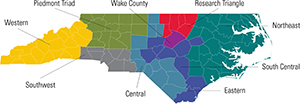Since it began in 1932, MWW, Inc. has seen its share of change. The company started as a small woodworking shop selling souvenirs like handmade baskets to leaf-peepers and vacationers passing through Hickory Nut Gap, NC. The second generation of MWW ownership added weaving to the company’s portfolio, and it began selling products to big box retailers in addition to mom-and-pop gift shops. Now in its third generation of family ownership, the company has embraced on-demand printing and production, which has quickly grown to make up 40 percent of the company’s business.
“People are starting to demand customization,” says Randy Gilliland, Vice President of Operations. “They want a sense of the unique, especially in their apparel and décor. They want to be able to have their own stamp on the product.”
But competition in the textile industry is fierce, and U.S. manufacturers are seldom able to compete with international manufacturers on price alone. If a customer wants a personalized product in three days, however, it’s very difficult to get it from an international supplier.
“Where we can compete,” says Gilliland “ is nearness to market. We can use speed and proximity to our advantage.”
In the race to delivery, every second counts. MWW was looking for ways to shave its production times and maintain a competitive edge. After a series of high-priced independent consultants and internal efforts failed to reach MWW’s desired outcomes, the company reached out to the E3: Economy, Energy and Environment initiative, administered by NC State University Industry Expansion Solutions. The solution offered MWW the opportunity to thoroughly assess their current operations and see where opportunities for improvement could be uncovered, and for an affordable price the company could get behind.
These assessments include a business excellence review, worker safety review, energy assessment, carbon footprint analysis and a “lean and green” manufacturing review; for this assessment, MWW, Inc. chose to focus on the department where its pillows were filled.
Making Every Second Count
Scott Sargent, MWW’s Director of Operations for Manufacturing, was immediately convinced that the company had made a smart decision in engaging IES. “The experts from IES were able to walk through the department and show exactly where the waste was, and describe what we could do to get rid of it,” says Sargent. “They came in with a lot of small, realistic ideas that could be easily implemented.”
Some benefits of the assessment process were seen in matter of hours; others continue to come to fruition years after the assessments were initially completed.
“Moving a box may save you one second, but if you do a thousand pieces a day, it really starts adding up. It really starts to affect thebottom line,” says Sargent. “The more volume you do, the greater the impact that one second has.”
As a consequence of its work with E3 and IES, MWW, Inc. has identified more than $2.3 million in savings opportunities. Retained sales make up the lion’s share of the company’s savings, proving that they are staying ahead of their international competitors.
Making the changes wasn’t the hard part, as both Gilliland and Sargent attest. The hard part was stepping away from the procedures and methods that nearly 400 workers were accustomed to—management included – toward something new and different.
“Nobody wants to be told that they’re doing something that could easily be improved,” says Sargent. “But the assessment process makes the job easier, makes life easier, and at the end of the day, makes the company more profitable.”
View a video about their success story here.
DOWNLOAD NOW » Click here to download a PDF of this Client Success Story.

